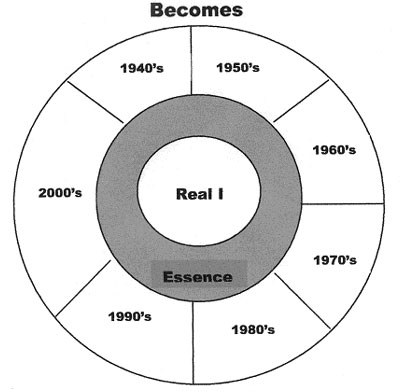 |
 |
Home | Contact |
 |
 |
 |
|
Part IVb
Gurdjieff often pointed to the existential role of incoming impressions upon the human psychology. From a psycho/spiritual point of view, the quality of incoming impressions effects humanity absolutely. Our everyday mechanical psychology reacts automatically to an endless variety/scale of incoming impressions. One of the greatest mistakes students can make is to identify with whatever situations or considerations they may be dealing with at the moment. Ouspensky once stated, "We are not what we are, but what we have become." Life itself is always transforming itself from one form into another. Ideas grow and develop, then fade away both in sequence as well as in stages. For example, there was a time when Homo sapiens were nomadic hunters and gatherers. Then humanity began to plant and harvest food. Soon after villages grew into cities. Once some form of existential safety/security was achieved, humanity had time left over to develop the arts. Once humanity began the industrial age, the consumer society began, thereby adapting to a consumer consciousness where disposable products became the norm. Not long after, interpersonal relationships also began to become interchangeable, disposable units. The human race went from an aboriginal 'tribal' consciousness, (separate but equal), into patriarchy. Then patriarchy dissolved into collectiveness along with equality between the sexes. Each millennium, each century, each decade ushers in a whole new way of being in this world. Each 'next' stage contains its own lifestyle. The food, the clothing, the mindset, changes automatically in reaction to the quality as well as to the quantity of incoming impressions. The human ego, (personality/false personality), is a quick-change artist. Our everyday, mechanical personality adapts to all incoming impressions. The problem is that life always transforms itself into whatever comes next. It is as if humanity is walking on a treadmill, forever walking towards a goal that always changes/recedes. On the other hand, our own internal essential level of being remains the same no matter how many changes are made in the outside world. By identifying with our life, we remain slaves to the outside world. By becoming non-identified with the states and stages of the outer world, the wise Work students become better able to observe the contents of their own essential inner nature. J Jesus once stated that we "must be in this world, but not of it:" whereas, Gurdjieff defined intelligence as the ability to adapt. The wise Work student has the ability to adapt to the ever-changing external world, while also being able to seek out the internal, essential-non-situational aspects of the self. Deciphering diagrams: "You Are What You Eat" by Adele Davis Principle: As above, so below. Micro as aspect of macro
Aspects of personality and false personality: 1940's = World War II 1950's = Suburbia 1960's =The Sexual Revolution 1970's =Feminism 1980's = AIDS - Planetary plague 1990's =1. Computers - Technology 2001 = War on Terrorism Principle: Personality is always changing in response to changing circumstances. Life itself is a series of incoming impressions. A Fourth Way inquiry might be: Who are you beyond your own situational background? Who are you beyond your automatic reaction to the ever-changing impressions of your life? |
|
|
|||||||||||||
| Sitemap |
|
|
|
|
|
|
|
|
|
|
|
|
|
|
|
|||||||||||||
© 2006 Sojourner Institute, All rights reserved
 Even though Adele Davis was referring to nutritional considerations, the Work would add that the principle of "You Are What You Eat" also refers to incoming impressions.
Even though Adele Davis was referring to nutritional considerations, the Work would add that the principle of "You Are What You Eat" also refers to incoming impressions.

